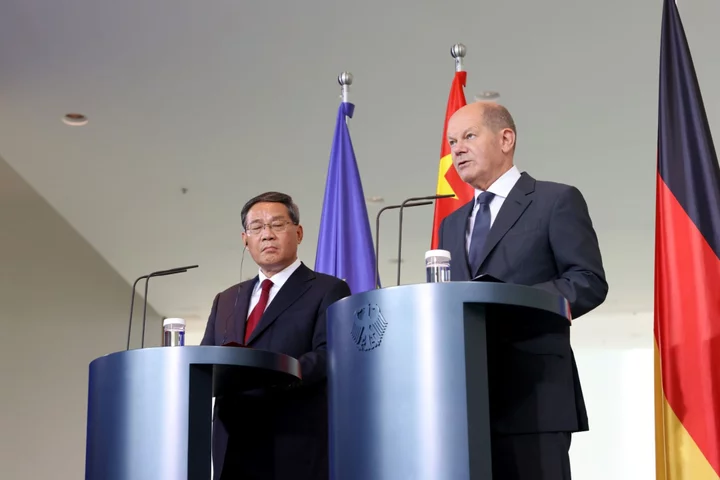Germany and China tentatively agreed to bind their economies more closely together and join forces to tackle climate change, even as Chancellor Olaf Scholz’s ruling coalition increasingly views the government in Beijing as a rival rather than partner.
Scholz hosted Chinese Premier Li Qiang for talks in Berlin Tuesday, which were attended by senior ministers from both governments. At a joint news conference, they each delivered a statement outlining areas where their nations can deepen cooperation but without providing much detail or taking questions from reporters.
Scholz’s government is due to publish an updated China policy in coming weeks that will frame Germany’s view of the world’s no. 2 economy as a rising rival and competitor. At the same time, officials in Berlin recognize that issues like global warming cannot be addressed without Chinese involvement.
In his statement, the German leader emphasized that it’s important to keep communication channels open and reiterated a request that China use its influence over President Vladimir Putin to help end the Kremlin’s war on Ukraine. He added a warning that it’s important that the government in Beijing “continues to not send weapons to Russia.”
Scholz also made references to the need for a level playing field for German companies operating in China, for respect for human rights and for journalists to be allowed more freedom of access to the Asian nation.
“As big CO2 emitters, Germany and China have a special responsibility in the fight against climate change,” Scholz said. Officials from the two countries also signed an initial agreement on exploring closer cooperation on electric and hydrogen mobility.
Li, who chose Germany as the first stop on his inaugural overseas trip as premier, said his government is ready to take ties with Europe’s biggest economy and the rest of the continent to a higher level.
“China and Germany, as two influential major powers in the world, should join hands to cooperate closely,” he told reporters. China is willing to collaborate in areas such as manufacturing, electric vehicles and green finance, he added, without providing details.
The talks in Berlin came on the same day Scholz’s government published its latest domestic intelligence report, which included China on a list of countries “with massive spying activities” in Germany, along with Russia, Iran and Turkey.
“For many years, China has been operating a comprehensive system of technology and know-how transfer to advance its civilian and military development,” according to the report.
It said the spying is targeting in particular “emerging technologies” such as quantum technology, artificial intelligence, hypersonic technology, surveillance technology and biotechnology, which it said are “becoming increasingly important in military terms.”
Scholz earned criticism from opposition lawmakers and others for holding a news conference with Li without allowing reporters to ask questions.
“It is unacceptable that the German chancellor cannot even stand up for democratic values in his own country when dealing with China,” Norbert Roettgen, a spokesman on foreign policy for the conservative CDU/CSU alliance, said in a tweet, adding that questions, including critical ones, “must be allowed.”
Author: Arne Delfs, Michael Nienaber and Li Liu

